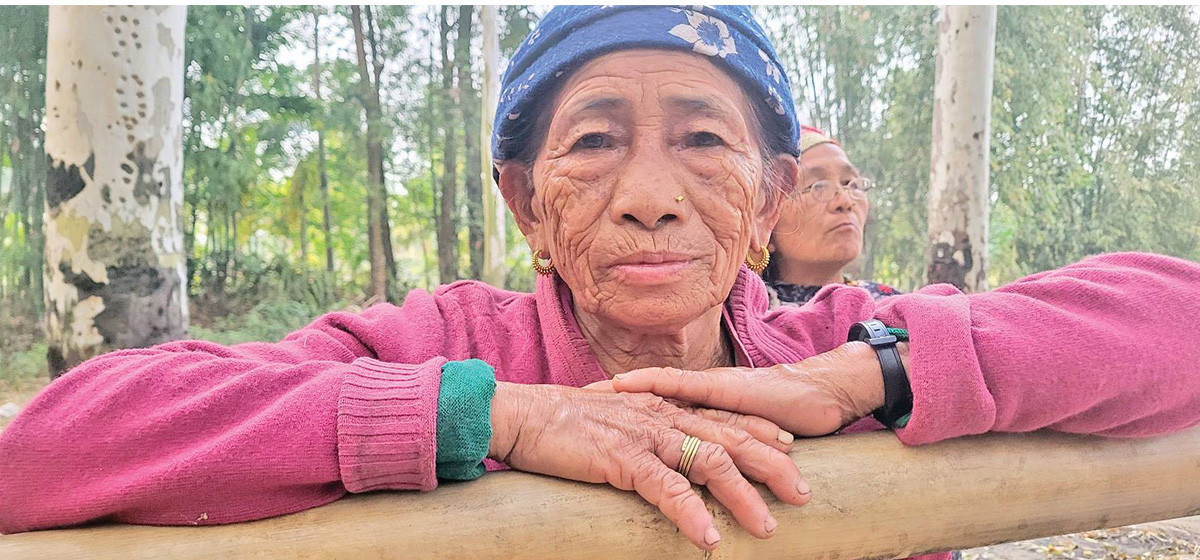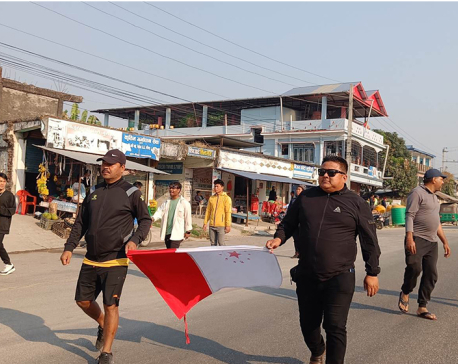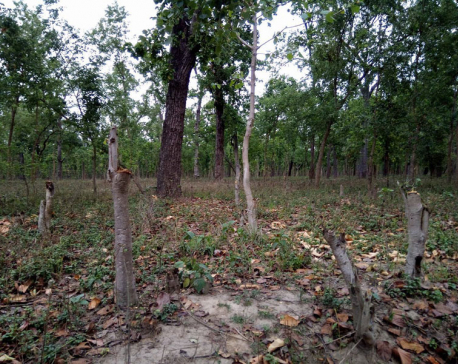
OR
Campaign to save wild elephants gathers momentum in eastern Nepal
Published On: February 26, 2024 09:15 PM NPT By: Upendra Lamichhane

Koshi Province walkathon, an initiative to protect elephants and reduce human-elephant conflict
KATHMANDU, Feb 26: Shiva Gandarva from Kachankawal, Jhapa, a victim of wild elephants, has been spreading awareness to save the lives of elephants through the medium of songs with the help of sarangi, a folk musical instrument. He has continuously been involved in the campaign to save elephants, stating that the existence of both humans and elephants is equally important.
“Elephants are a beautiful creation of nature,” he said, “Rather than chasing and killing elephants, it is better to avoid encounters with them by adopting careful measures.”
Thousands have been mutilated in the elephant-affected areas of Koshi Province and hundreds have died. Crops worth hundreds of thousands have been damaged. Yet, there is no shortage of elephant sympathizers.
Another compelling example of such positive thinking is 77-year-old Krishnamaya Limbu. Wild elephants destroyed her house twice, and her crops have been destroyed dozens of times. Her relatives have been severely injured in attacks from wild elephants, resulting in the deaths of dozens of her loved ones, yet Limbu has no complaint against the elephant.
“Elephants’ body structure is so huge that they might have entered human settlements due to hunger,” said Limbu, adding, “Who can wild elephants count on?”
She believed that due to increased deforestation and expansion of human settlements, there is a shortage of food for elephants. She expressed that if there had been plenty of food in the forest, the damages caused by elephants could have been much less.
“Elephants did not enter the villages to cause damage, they came here to save their lives,” said 64-year-old Lilawati Rai, “We have the same feelings for elephants as for our children.”
The main participants of a walkathon, which started in Koshi Province on Wednesday with the aim of re-establishing the traditional path of elephants protecting their habitat and reducing human-elephant conflict, said that both elephants and humans should be protected. Not only the general public but also the people's representatives are involved in the campaign to save the elephants and the people.
Some time ago, the municipality of the elephant-affected areas issued a four-point joint declaration to draw the attention of the federal government and the provincial government, in coordination with the local level, to create an elephant-friendly environment and develop the forest area as a tourism destination.
“It is important to move forward by accepting coexistence, not by antagonizing elephants,” said Arjun Kumar Karki, chairman of Mechinagar-4, “Now we are trying to create a friendly environment between humans and elephants.” He said that it is necessary to create a suitable environment where both can live safely.
During the walkathon, the locals not only expressed their suffering but also suggested ways to protect both elephants and humans. Most of them emphasized the need to create an elephant-friendly environment. Chief Minister Kedar Karki said that during his journey, the elephant victims were concerned about how to earn a living rather than getting angry with the elephants.
“They believe that lives will be saved if the elephants do not have to be driven away when they start eating the crops,” he said, “If full compensation is provided to the villagers for the destroyed crops, the problem will be solved to some extent.”
Minister for Forests and Environment Birendra Mahato has said that the federal government will also support this campaign of the provincial government to protect both elephants and people. He said that this initiation is very inspiring for accepting the coexistence of both humans and elephants.
Hundreds of Asian elephants have roamed their natural habitats in Nepal, South Asia, and Assam and West Bengal in India for centuries. Every year, these elephants cross the Mechi River from Assam in India and enter Nepal from Bahundangi in Jhapa District, traveling throughout Jhapa, Morang, Sunsari, and Udayapur Districts of Koshi Province.
Chief Minister Karki's team has been on a continuous jungle walkathon since February 21. In order to understand the problems of the people of elephant-affected areas and to find a solution, the walkathon that started from Bahundangi in Mechinagar, Jhapa crossed Koshi River after five days. The chief minister's office said that the walkathon will conclude after covering a distance of 240 km and reaching Katari, Udayapur.
You May Like This

SC annuls appointment of Koshi Province CM Thapa, gives seven days to form a new govt of two or more parties
KATHMANDU, July 28: The Supreme Court (SC) has revoked the appointment of Uddhav Thapa as Chief Minister of the Koshi... Read More...

Five protestors arrested in Jhapa
JHAPA, March 12: Police have arrested five members of the Limbuwan Kirant Sangharsh Samiti in Jhapa, who stopped the riders... Read More...

Rampant deforestation threatens community forests in Kailali
TIKAPUR, May 30: Some years ago, Prabhunarayan Chaudhari would not dare to walk alone through the dense jungle near Tikapur.... Read More...







Just In
- NRB to provide collateral-free loans to foreign employment seekers
- NEB to publish Grade 12 results next week
- Body handover begins; Relatives remain dissatisfied with insurance, compensation amount
- NC defers its plan to join Koshi govt
- NRB to review microfinance loan interest rate
- 134 dead in floods and landslides since onset of monsoon this year
- Mahakali Irrigation Project sees only 22 percent physical progress in 18 years
- Singapore now holds world's most powerful passport; Nepal stays at 98th











Leave A Comment